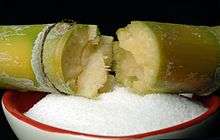Sugarcane juice


Sugarcane juice is the juice extracted from pressed sugarcane. It is consumed as a beverage in many places, especially where sugarcane is commercially grown such as Southeast Asia, the Indian Subcontinent, Egypt, and Latin America. Evaporated cane juice as an ingredient in prepared food and beverages indicates a sweetener (a sugar) derived from sugar cane syrup.[1]
Sugarcane juice is obtained by crushing peeled sugar cane in a mill and is one of the main precursors of rum.
Health Benefits
Prevents cancer: Sugarcane juice is alkaline in nature because of the high concentration of calcium, magnesium, potassium, iron, and manganese, which helps prevent diseases like cancer, that cannot survive in an alkaline environment. Thus it helps in fighting various types of cancer such as prostate and breast cancer. Aids in digestion: It is good for the well-being of the digestive system due to its high potassium levels. It helps in keeping the digestive system in good shape, prevents stomach infections and is considered to be particularly useful in treating the problem of constipation. Prevents heart diseases: It also prevents heart diseases and stroke as it helps decrease the levels of unhealthy or cholesterol and triglycerides. Helps in reducing weight: As sugarcane juice reduces the bad cholesterol levels in the body and has natural sugars, it helps in reducing weight. It is high in soluble fibre which aids in shedding weight. Good for treating diabetes: Sugarcane is sweet in taste and is full of natural sweeteners, which have a low gylcemic index (GI), hence it works very well for diabetic patients. Clears skin imperfections: When it comes to healthy skin, Alpha Hydroxy Acids (AHAs) which are part of the natural constituents of sugarcane juice, are supposed to have a lot of benefits. They fight acne, reduce blemishes, prevent ageing and help in keeping the skin hydrated. Just apply sugarcane juice to your skin and let it dry or add it to your favourite face mask and scrub, and your skin will look radiant and clean. [2]
Sugarcane Juice contains Policosonol. Policosanol is technically not a sugar, but a collection of long-chain alcohols that are waxy in composition. It contains no carbohydrates and offers no calories, so it doesn't have an adverse effect on your blood sugar levels, as cited in the “Encyclopedia of Human Nutrition." Policosanol is usually taken in attempts to lower blood cholesterol levels, reduce the risk of atherosclerosis, which is narrowing and hardening of arteries, and as an antioxidant. Policosanol does not require a prescription and is widely available online and in health food stores, typically in 10 and 15 mg capsules. Policosanol can also be extracted from wheat germ, yams and beeswax.
Evaporated cane juice
Evaporated cane juice is a loosely defined term that can include combinations of sugars including glucose and fructose. Evaporated cane juice is a partially purified sugar, produced from a single-crystallization process during sugar cane milling.
The US Food and Drug Administration (FDA) defines evaporated cane juice as any sweetener derived from sugarcane syrup. The US FDA considers the term “evaporated cane juice” to be misleading because the term incorrectly suggests that it is a juice, when it is sugar syrup. Instead, the US FDA recommends using “sugar cane syrup” or “dried cane syrup” on food labels.[1]
Regions
Vietnam
Sugarcane juice, called nước mía or mía đá, is very popular in Vietnam as a refreshing drink in the hot climate. Kumquat juice, a citrus, is often added to balance the sweetness.[3] It is available at small street stalls and is often sold alongside other popular Asian beverages. It was common for sugarcane juice to be sold in small plastic bags filled with ice, with the open end attached around a drinking straw by a rubber band. It is now more commonly sold in disposable plastic cups.[4]
Africa
Madagascar
In the eastern region of Madagascar, sugarcane juice is fermented to make an inexpensive alcoholic beverage called betsa-betsa. The drink is popular with locals because it is cheaper than beer.[5]
See also
References
- 1 2 "DRAFT Guidance for Industry: Ingredients Declared as Evaporated Cane Juice; Draft Guidance", Food and Drug Administration, October 2009.
Joe Satran, "Trader Joe's Lawsuit Over 'Evaporated Cane Juice' Part of Firm's Crusade Against Mislabeled Foods", The Huffington Post, 29 March 2013.
- ↑ http://indiatoday.intoday.in/story/sugarcane-from-weight-loss-to-clearing-up-your-skin-benefits-of-drinking-ganne-ka-ras-for-cancer-health-digestion-diabetes/1/549192.html
- ↑ "Sweetest at the throat". March 30, 2010. Retrieved November 7, 2011.
- ↑ "Nuoc mia, or sugar-cane juice". November 6, 2008. Retrieved November 7, 2011.
- ↑ http://books.google.mg/books?id=yeG1AwAAQBAJ&pg=PA107&dq=betsa-betsa&hl=en&sa=X&ei=55RQVO7YHcL5ygORoYDAAg&ved=0CFIQ6AEwCA#v=onepage&q&f=false
